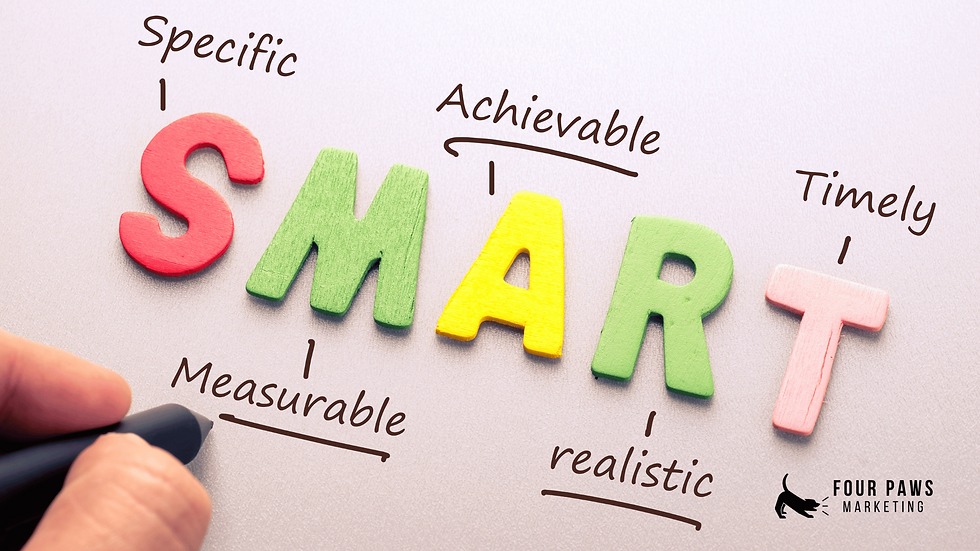Setting SMART Business Goals for 2025: Achieve Your Vision
- Barry Larson
- Dec 18, 2024
- 4 min read
Updated: Apr 25

As a business owner, setting goals is crucial for growth and success. But, not all goals are created equal. Vague aspirations like "grow my business" or "improve marketing" can lead to frustration because they lack a clear path to achievement. That's where SMART goals come in—it provides a proven framework that ensures your objectives are Specific, Measurable, Achievable, Relevant, and Time-bound.
If you want 2025 to be a successful year, SMART goals are a great way forward. Let’s dive into what SMART goals are, how to create them, and tips to stay on track.
What Are SMART Goals?
The SMART framework turns your dreams into actionable objectives by providing clarity, focus, and motivation. Here’s a breakdown:
Specific: A well-defined goal answers the "who, what, where, and why" of what you hope to accomplish.
Measurable: Decide what you will use to track progress and measure success.
Achievable: Your goal should stretch you but still be within reach given your resources and circumstances.
Relevant: Align your goal with your larger business objectives and priorities.
Time-bound: Set a realistic deadline to create urgency and keep you accountable.
For example, instead of saying, "I want more customers," a SMART goal could be:"Increase my customer base by 15% within six months by developing and implementing a referral program as well as creating targeted social media campaigns."
Why SMART Goals Are Essential for 2025
The current business landscape is constantly changing, and 2025 will bring plenty of new challenges and opportunities. SMART goals will help your business:
Stay Focused: Narrow your attention to what truly matters.
Track Progress: Quantifiable metrics help you see how far you’ve come and adjust strategies as needed.
Boost Motivation: Clear, achievable milestones keep you and your team inspired.
Improve Resource Allocation: Spend time, energy, and money wisely by focusing on high-impact initiatives.
How to Set SMART Goals for Your Business
1. Start with a Vision
Decide where you would like your business to be at the end of 2025. Do you hope to expand your customer base, launch new products, or enhance your team’s efficiency? Your long-term vision will help identify the "why" behind your goals.
2. Break Down Your Vision into SMART Goals
Let’s say your vision is to increase revenue by 25% in 2025. Now, break that down into SMART goals:
Specific: “Increase revenue by 25% by focusing on upselling to current customers and acquiring new clients in the Midwest region.”
Measurable: “Generate $500,000 in additional revenue.”
Achievable: Ensure your target is realistic based on market trends and your business capacity.
Relevant: This goal aligns with your overarching desire to grow your business sustainably.
Time-bound: “Reach this goal by December 31, 2025.”
3. Involve Your Team
Talk with your employees and ask them to set individual goals that align with their roles and expertise. Engaged team members are more committed to achieving company objectives.
4. Focus on Short-Term and Long-Term Goals
Break your yearly objectives into quarterly and monthly milestones to maintain momentum.
Examples of SMART Goals for 2025
Marketing Goals
Specific: Launch a TikTok ad campaign targeting Gen Z consumers.
Measurable: Achieve 10,000 video views and generate 500 leads within three months.
Achievable: Use existing content creation resources and a $5,000 ad budget.
Relevant: Attract younger customers to grow your brand’s market share.
Time-bound: Start the campaign on February 1, 2025, and conclude it by April 30, 2025.
Operational Goals
Specific: Reduce customer service response times.
Measurable: Achieve a 50% decrease in average response time from 24 hours to 12 hours.
Achievable: Implement AI-based chat support and train staff on new tools.
Relevant: Enhance customer satisfaction and retention.
Time-bound: Complete implementation by June 2025.
Staying Accountable to Your SMART Goals
Setting goals is one thing; achieving them is another. Here are a few simple strategies to help your business stay on track throughout the year:
1. Review Progress Regularly
Schedule weekly or monthly meetings to review and assess progress and make any necessary adjustments. Tools like Trello, Asana, or Google Sheets can help you organize and track tasks and metrics.
2. Celebrate Milestones
Reward your team (and yourself) for hitting important milestones along the way. Recognition helps keep morale high and make sure everyone stays motivated.
3. Learn from Setbacks
If you don’t quite reach one of your goals, don’t get discouraged. Analyze what went wrong, adjust your strategy, and keep moving forward.
4. Stay Flexible
The business world is unpredictable. Be willing to adjust your goals to market conditions or unexpected challenges.
Pro Tips for Setting SMART Goals
Use Action-Oriented Language: Write your goals as if you’re already taking steps (e.g., "Launch a new product line" vs. "Think about new products").
Make Goals Visible: Post your goals in a place where your team can see them every day, like a shared dashboard or physical whiteboard.
Leverage Technology: Use analytics tools to track progress and identify trends early.
Your 2025 Success Plan Starts Today
As 2024 comes to a close, now is the perfect time to reflect on what you’ve achieved and plan for what’s next. Setting SMART goals will provide the direction and motivation you need to make 2025 a great year.
It is important to keep things in perspective, success doesn’t happen overnight—it’s built one specific, measurable, achievable, relevant, and time-bound goal at a time. So dream big, stay focused, and take steps toward your vision.



Comments